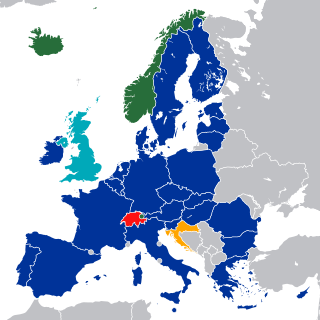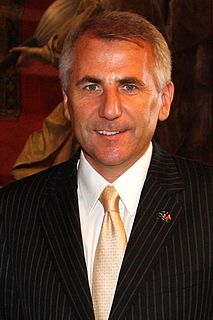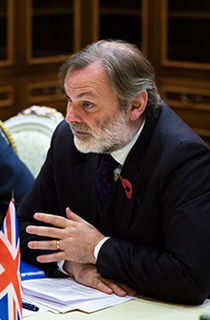Related Research Articles
Cyprus is a member of the United Nations along with most of its agencies as well as the Commonwealth of Nations, World Bank, International Monetary Fund and Council of Europe. In addition, the country has signed the General Agreement on Tariffs and Trade (GATT) and the Multilateral Investment Guarantee Agency Agreement (MIGA). Cyprus has been a member of the European Union since 2004 and in the second half of the 2012 it held the Presidency of the Council of the European Union.
The Republic of Estonia gained its independence from the Russian Empire on 24 February 1918 and established diplomatic relations with many countries via membership of the League of Nations. The forcible incorporation of Estonia into the Soviet Union in 1940 was not generally recognised by the international community and the Estonian diplomatic service continued to operate in some countries. Following the restoration of independence from the Soviet Union, Russia was one of the first nations to re-recognize Estonia's independence. Estonia's immediate priority after regaining its independence was the withdrawal of Russian forces from Estonian territory. In August 1994, this was completed. However, relations with Moscow have remained strained primarily because Russia decided not to ratify the border treaty it had signed with Estonia in 1999.

After independence in 1966, Guyana sought an influential role in international affairs, particularly among Third World and non-aligned nations. It served twice on the UN Security Council. Former Vice President, Deputy Prime Minister, and Attorney General Mohamed Shahabuddeen served a 9-year term on the International Court of Justice (1987–96).
The foreign relations of Ireland are substantially influenced by its membership of the European Union, although bilateral relations with the United States and United Kingdom are also important to the state. It is one of the group of smaller nations in the EU, and has traditionally followed a non-aligned foreign policy. Ireland has historically tended towards independence in foreign military policy, thus it is not a member of the North Atlantic Treaty Organisation and has a longstanding policy of military neutrality. According to the Irish Defence Forces, the neutrality policy has helped them to be successful in their contributions to United Nations peace-keeping missions since 1960 and subsequently in Cyprus, Lebanon and Bosnia and Herzegovina.

The foreign relations of North Macedonia since its independence in 1991 have been characterized by the country's efforts to gain membership in international organizations such as NATO and the European Union and to gain international recognition under its constitutional name, overshadowed by a long-standing, dead-locked dispute with neighboring Greece. Greek objections to the country's name have led to it being admitted to the United Nations and several other international fora only under the provisional designation Former Yugoslav Republic of Macedonia.
The foreign relations of Norway are based on the country's membership in NATO and within the workings of the United Nations (UN). Additionally, despite not being a member of the European Union (EU), Norway takes a part in the integration of EU through its membership in the European Economic Area. Norway's foreign ministry includes both the minister of foreign affairs and minister of international development.
Iceland took control of its foreign affairs in 1918 when it became a sovereign country, the Kingdom of Iceland, in a personal union with the King of Denmark. As a fully independent state, Iceland could have joined the League of Nations in 1918, but chose not to do so for cost reasons. It negotiated with Denmark to initially carry out most of its foreign relations, while maintaining full control. Denmark appointed a diplomatic envoy (Ambassador) to Iceland in 1919 and Iceland reciprocated in 1920, opening an Embassy in Copenhagen. Iceland established its own Foreign Service in April 1940 when Denmark became occupied by Nazi Germany and ties between the two countries were severed. The Republic of Iceland was founded in 1944. The Icelandic foreign service grew slowly in the post-WWII period, but increased rapidly after the mid-1990s. Iceland's closest relations are with the Nordic states, the European Union and the United States. Iceland has been a member of the United Nations since 1946. Iceland was a founding member of the World Bank in 1946 and NATO in 1949. In terms of European integration, Iceland was a founding member of the OEEC in 1948 and the Nordic Council in 1952, it joined EFTA in 1970, was a founding member of the CSCE in 1973 and the EEA in 1992 and joined Schengen in 1996.

The European Economic Area (EEA) was established via the Agreement on the European Economic Area, an international agreement which enables the extension of the European Union's single market to member states of the European Free Trade Association. The EEA links the EU member states and three EFTA states into an internal market governed by the same basic rules. These rules aim to enable free movement of persons, goods, services, and capital within the European Single Market, including the freedom to choose residence in any country within this area. The EEA was established on 1 January 1994 upon entry into force of the EEA Agreement. The contracting parties are the EU, its member states, and Iceland, Liechtenstein, and Norway.

Knut Vollebæk is a former Norwegian diplomat to the United States, (2001–2007, and centrist politician. He is currently a member of the International Commission on Missing Persons Board of Commissioners and heads a government commission investigating the situation of Norwegian Travellers.

This is a list of referendums related to the European Union, or referendums related to the European Communities, which were predecessors of the European Union. Since 1972, a total of 48 referendums have been held by EU member states, candidate states, and their territories, with several additional referendums held in countries outside of the EU. The referendums have been held most commonly on the subject of whether to become a member of European Union as part of the accession process, although the EU does not require any candidate country to hold a referendum to approve membership or as part of treaty ratification. Other EU-related referendums have been held on the adoption of the euro and on participation in other EU-related policies.

Jean-François Deniau was a French politician, diplomat, essayist and novelist. Until 1998, he was a member of the Union for French Democracy (UDF).
Inam-ul-Haq is a Pakistani career diplomat who served as the Foreign Minister of Pakistan in the caretaker government of Muhammad Mian Soomro for four months from November 2007 till March 2008. He also remained Minister of State for Foreign Affairs from June 2002 till the appointment of Khurshid Mahmud Kasuri as Foreign Minister in November 2002, and Foreign Secretary, the highest post of Ministry of Foreign Affairs, after he replaced Shamshad Ahmad in February 2000.

Moldovan-Spanish relations are foreign relations between Spain and Moldova. On 30 January 1992 Spain established diplomatic relations with Moldova. As of 2009 Spain does not have an embassy in Chişinău. Spain is represented in Moldova via its embassy in Bucharest in Romania.

This article deals with the diplomatic affairs, foreign policy and international relations of Barbados.

Vygaudas Ušackas is a former Lithuanian diplomat, from September 2013 to October 2017 he served as the European Union's Ambassador to Russia. Prior to that he served as the EU Special Representative for Afghanistan. Prior to heading Lithuania's Ministry of Foreign Affairs, Ušackas was the Ambassador of Lithuania to the United States and Mexico from 2001 through 2006, then Ambassador to the United Kingdom. Founder of Mission Siberia.

Wegger Christian Strømmen is a Norwegian diplomat and politician who is Political Director of the Norwegian Ministry of Foreign Affairs.

Alexander Vladimirovich Yakovenko is a Russian diplomat. He served as the Ambassador of Russia to the United Kingdom between January 2011 and August 2019. Since August 2019, he has been rector of the Diplomatic Academy of the Ministry of Foreign Affairs. He is a former Deputy Minister of Foreign Affairs of Russia. While working at the Ministry of Foreign Affairs in Moscow, he was in charge of multilateral diplomacy. A graduate of the Moscow State Institute of International Relations in 1976, he later gained a Doctor of Law degree. Yakovenko holds the diplomatic rank of Ambassador Extraordinary and Plenipotentiary, and speaks Russian, English and French.
Eivinn Berg was a Norwegian diplomat and politician for the Conservative Party.

The foreign relations of the State of Palestine have been conducted since the establishment of the Palestine Liberation Organization (PLO) in 1964. In November 1988, the PLO's Palestinian National Council declared the independence of the State of Palestine and in 1994 the PLO established the Palestinian National Authority (PNA) following the Oslo Accords. The PLO Executive Committee performs the functions of the government of the State of Palestine. Currently, the PLO maintains a network of offices in foreign countries and also represents the PNA abroad.

Sir Timothy Earle Barrow is a British diplomat who served as Permanent Representative of the United Kingdom to the European Union from 2017 to 2020 and as the British Ambassador to the European Union from 2020 to 2021.
References
- 1 2 "Tarald Osnes Brautaset". Store norske leksikon (in Norwegian). Retrieved 1 March 2010.
- ↑ "60 år 28. september: Spesialrådgiver Tarald O. Brautaset" (in Norwegian). Norwegian News Agency. 12 September 2006.
- ↑ Andreassen, Thorleif (27 February 2000). "London-ambassadør i "surprise party"". Aftenposten (in Norwegian).
- ↑ Strømmen, Karl-R. (16 February 2007). "Kamp om København". Dagens Næringsliv (in Norwegian). p. 16.